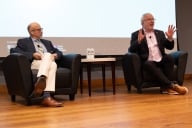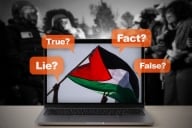You have /5 articles left.
Sign up for a free account or log in.
The U.S. Departments of Education and Justice on Tuesday released an open letter to colleges expressing concern that some institutions might be “using electronic book readers that are not accessible to students who are blind or have low vision” and warning them that the government will crack down on any institutions that are “requiring” disabled students to use emerging technology that does not comply with federal accessibility laws.
The departments were aiming to address an issue that came up one year ago, when the American Council for the Blind and the National Federation for the Blind sued Arizona State University for giving out Amazon Kindle DX e-readers to students in an effort to learn more about the device's implications for higher education. The groups contended that because blind students could not use the devices, the giveaways violated equal rights protections ensured to disabled students. The Justice Department subsequently investigated five other colleges for similar Kindle pilot programs, shutting down the experiments at four of them.
Tuesday's "Dear Colleague" letter, which rehashed the cases and invited colleges to consult with the departments on compliance, was a punctuation mark to a terse rebuke to colleges that might be conducting similar trials without ensuring that disabled students do not get short shrift. The Justice Department recently has emphasized its unwillingness to tolerate slights against disabled students as colleges begin adopting new technologies.
The National Federation of the Blind heralded the government's letter. "[The federation] is pleased that the administration has taken this positive step in making colleges and universities aware of their legal obligations to blind students with respect to e-book devices,” a spokesman for the federation told Inside Higher Ed in a statement.
“There is simply no good reason why e-books and the devices and applications used to read them cannot be made accessible to the blind, and we expect colleges and universities to demand that both e-book readers and the content available for them can be fully utilized by all of their students, blind or sighted,” the spokesman said.
Daniel F. Goldstein, an attorney for the federation, said his one nitpick was that the language of the letter implied that it would be acceptable for colleges to provide blind students with an equal alternative to any new technological tool. “I’m not happy about that,” Goldstein said. “That’s the tooth fairy -- there is no equal alternative. Separate is not equal, and some colleges might see this as permission to buy inaccessible technology and rely on their department of disability services to provide accessibility.”
Goldstein said he would also like to see a follow-up letter that instructs colleges to use only e-reader content that makes accommodations for blind students, since this one refers only to devices.
But some observers had deeper concerns about the letter -- and how the advocacy groups and the federal agencies handled the whole issue.
Martin Ringle, chief information officer at Reed College, one of the institutions to incur the ire of the Justice Department, said that while he agrees “100 percent” with the principles of equal access for disabled students, the government might have been misguided in going after colleges for mere dabbling.
“It is important to distinguish between the adoption of technology and a pilot study designed to evaluate it,” Ringle wrote in an e-mail to Inside Higher Ed. “Colleges and universities must have the freedom to conduct such assessments in order to determine for themselves the potential value, as well as the shortcomings, of new technologies.”
Tracy Mitrano, director of I.T. policy at Cornell University, had even more pointed words. “To go after a handful of schools that wanted to pilot pioneering technology with the full force of the DOJ is overkill,” Mitrano told Inside Higher Ed. “It’s a very sorry statement about how the government looks at higher education. [And] it’s a sorry statement about how other organizations with which we have strong affinities, such as the National Federation for the Blind, regard higher education.”
That is: as a scapegoat for the organizations’ objections to the lack of accommodations being provided by companies such as Amazon, which makes the Kindle, Mitrano said. Instead of going after the giant company, the advocacy groups and the Justice Department picked on easier targets: nonprofit colleges that would fold more easily.
This might have allowed the groups and the government to make their point more expediently, she said. But she agreed with Ringle that targeting college pilot programs would come at a cost. “It will deter innovation,” said Mitrano, “and it will deter the kind of innovation that will ultimately help students with disabilities.”








